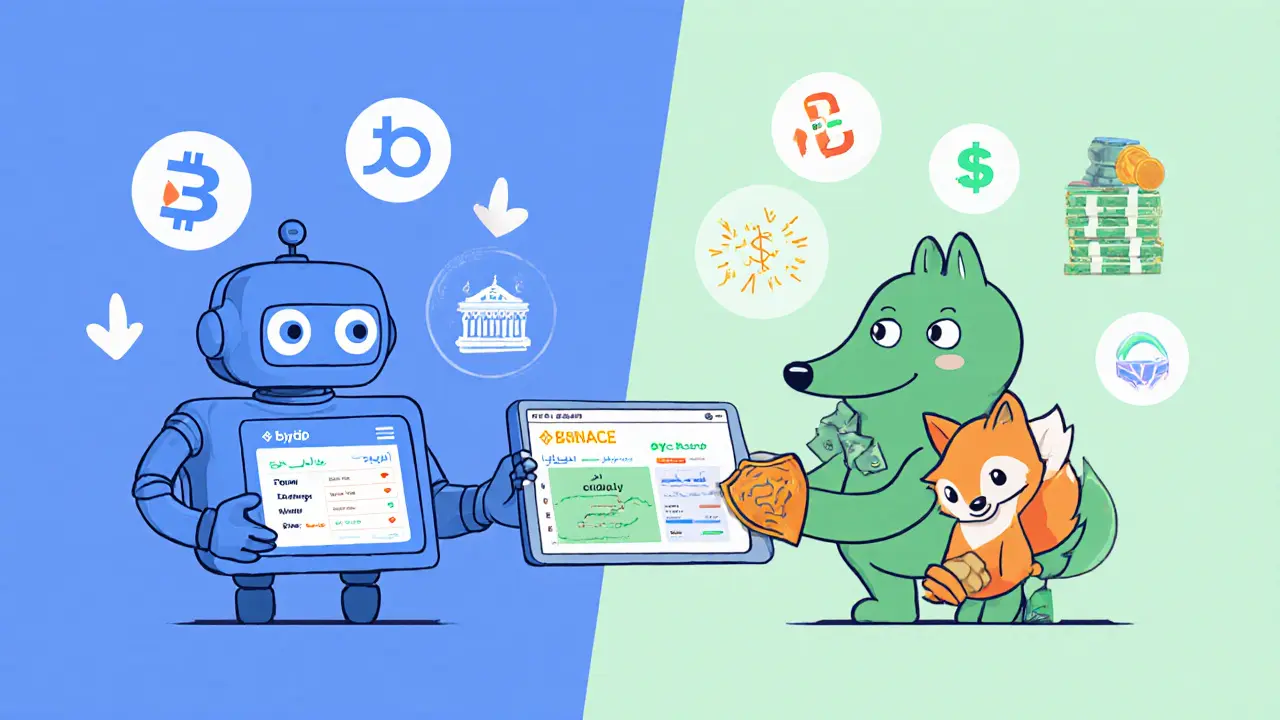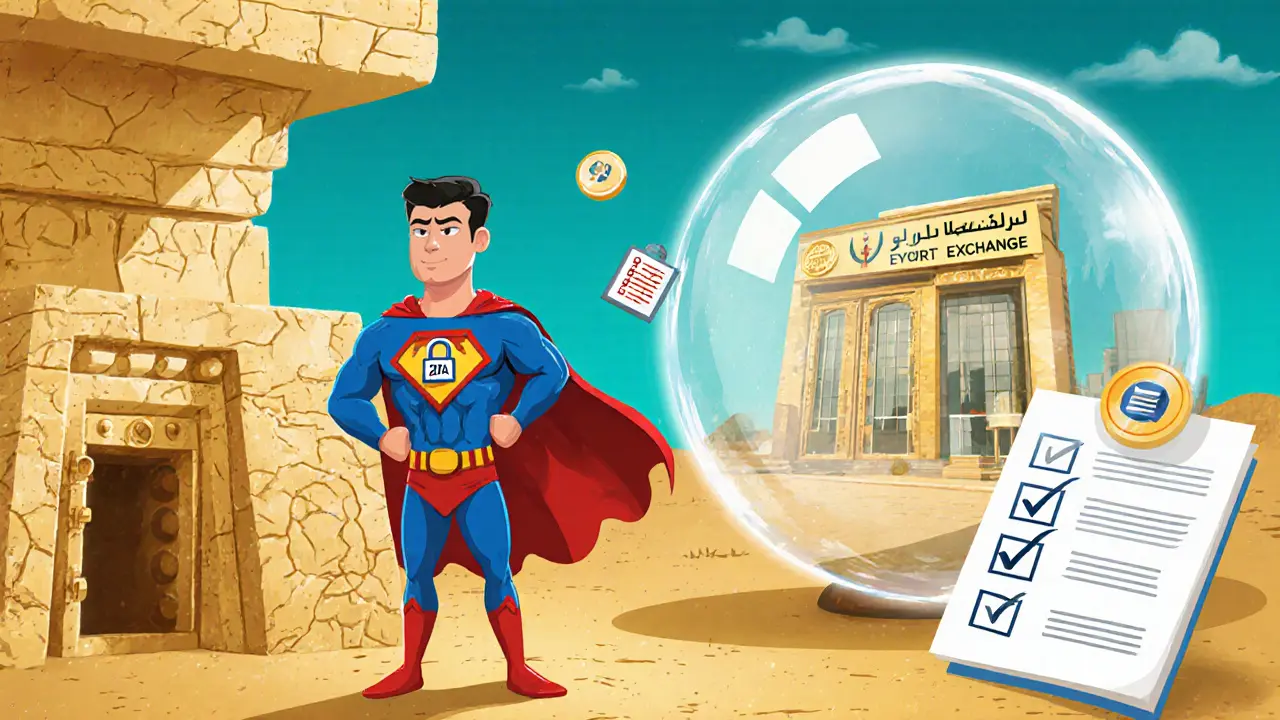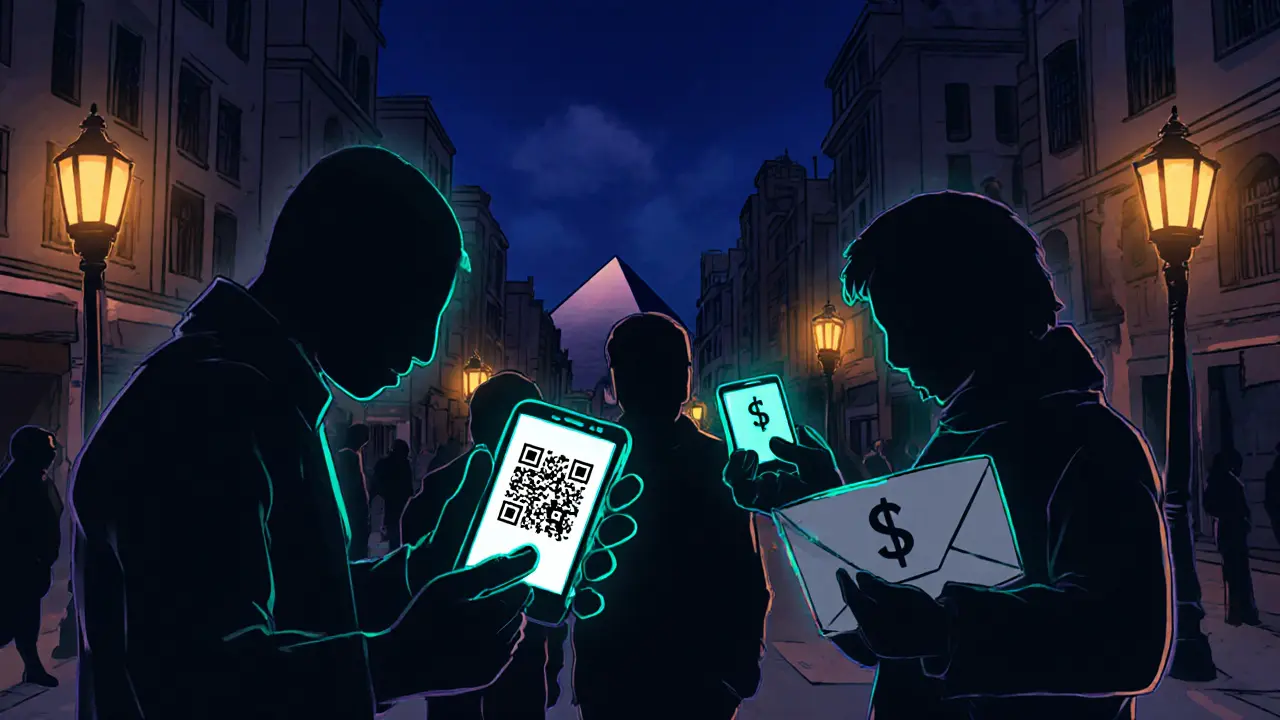Egyptian Crypto P2P Trading Guide
Bybit
Zero P2P fees, EGP support, 2FA, cold storage, Arabic UI.
0% P2P FeeBinance
Robust P2P desk, EGP deposits, SAFU insurance, Arabic support.
0% P2P FeeOKX
Limited P2P, cold wallet, anti-phishing code, Arabic FAQ.
0.15% Spot FeeGate.io
Third-party match-making, hardware wallet integration, 2FA.
0.2% Spot FeeSecurity Tips for P2P Trading
- Enable 2FA on all accounts
- Use cold storage for large holdings
- Check seller reputation before trading
- Avoid reusing wallet addresses
- Stay informed about regulatory changes
Payment Methods to Avoid Bank Blocks
- Label transfers as gifts or loans
- Use mobile money apps (Fawry, Vodafone Cash)
- Meet in person for cash transactions
- Mix currency payments (USDT + EGP)
Egyptian cryptocurrency P2P trading is a the practice of buying and selling digital assets directly between individuals in Egypt, bypassing banks and formal exchanges that face heavy regulation. With the Central Bank tightening its grip, many Egyptians have turned to peer‑to‑peer networks to keep their crypto lives moving. Want to know how they do it, which platforms survive the gray‑zone, and what risks you should watch out for? Read on.
Quick Take
- Law No. 194 of 2020 bans unlicensed crypto services, pushing most trading underground.
- Bybit and Binance dominate the local P2P scene thanks to zero‑fee EGP markets.
- Typical payment methods include bank transfers, mobile wallets, and even cash‑hand‑offs.
- Security hinges on 2FA, cold storage, and choosing platforms with Arabic support.
- Expect the underground ecosystem to grow until clear regulations appear.
Why the Underground? The Regulatory Backdrop
In 2020 the Central Bank of Egypt issued Law No. 194, demanding a license for any crypto‑related activity. The law doesn’t label crypto illegal, but it makes operating a local exchange virtually impossible without approval that never comes. Banks, fearing penalties, block any transaction flagged as crypto‑related, so users can’t simply move funds from a local account to an exchange.
That regulatory vacuum creates two strong incentives: first, a desire to keep the market alive despite official warnings; second, a need to protect personal funds when the state offers no consumer safeguards. The result? A thriving underground network where traders match up on P2P platforms, often using everyday payment channels that banks won’t scrutinize.
Key Players: P2P Platforms That Still Work
The market hasn’t collapsed because a handful of international exchanges have built dedicated P2P hubs for Egyptians. Here’s a snapshot of the most popular services:
| Platform | P2P Availability | EGP Deposit Options | Typical Fees | Security Highlights |
|---|---|---|---|---|
| Bybit | Full‑featured P2P marketplace | Bank transfer, credit/debit card, Apple Pay, mobile wallets | 0% P2P fee, 0.1% spot fee | 2FA, cold storage, Arabic UI, Shariah‑compliant options |
| Binance | Robust P2P desk | Bank transfer, local e‑wallets, cash‑pickup via agents | 0% P2P fee, 0.1% spot fee | Device management, SAFU insurance fund, Arabic support |
| OKX | Limited P2P, mainly institutional | Bank transfer only | 0.15% spot fee, small P2P spread | Cold wallet, anti‑phishing code, Arabic FAQ |
| Gate.io | No native P2P, relies on third‑party match‑making | Credit/debit cards, PayPal (via gateway) | 0.2% spot fee, no P2P fee | Hardware‑wallet integration, 2FA, multilingual UI |
Bybit and Binance dominate because they explicitly market EGP‑denominated P2P trades and keep fees at zero, a crucial factor when margins are thin. OKX and Gate.io still attract some traders-especially institutions-because they offer deeper liquidity for larger orders.

How to Get Started on a P2P Platform
- Choose a platform that supports EGP P2P (Bybit or Binance are safest bets).
- Create an account using your phone number; most services now offer an Arabic interface for smoother onboarding.
- Enable two‑factor authentication and link a hardware wallet if you plan to hold large balances.
- Navigate to the P2P marketplace and filter listings by payment method-bank transfer is most common, but cash‑hand‑off via trusted friends can be lower‑cost.
- Read the seller’s reputation score. A green badge typically means at least 100 successful trades and positive feedback.
- Initiate the trade, follow the escrow instructions, and confirm receipt of funds before releasing the crypto.
Notice how every step uses the platform’s built‑in escrow. That safety net is essential because, unlike a regulated exchange, you have no legal recourse if the other party disappears.
Payment Tricks Egyptians Use to Dodge Bank Blocks
Even with a P2P marketplace, banks can still flag transfers that mention crypto. Traders have developed a few workarounds:
- Bank‑to‑bank “friends‑and‑family” transfers: Label the payment as a personal loan or gift, which most banks treat as benign.
- Mobile money apps: Services like Fawry or Vodafone Cash let users move small sums instantly, often slipping past traditional screening.
- Cash‑in‑person handoffs: Some groups meet at cafés, exchange cash for a QR‑code that unlocks the crypto wallet.
- Mixed‑currency invoices: Traders convert a portion of the payment to a stablecoin (USDT) on the platform, then settle the remainder in EGP through a friend's bank account.
Each method carries its own risk-miscommunication, counterfeit cash, or a bank suddenly freezing the account. That’s why you’ll hear traders stress the importance of a trusted network.
Security & Risk Management in the Grey Zone
Operating underground means you can’t rely on consumer protection bodies. Your best defense is a layered security approach:
- Two‑factor authentication on every exchange and email account.
- Cold storage for the bulk of your holdings; keep only a trading‑size amount on the exchange.
- Regular address rotation-avoid reusing the same wallet for multiple trades.
- Reputation checks on P2P counterparties; never trade with a brand‑new user.
- Legal awareness-stay updated on any new CBE announcements that could affect P2P activity.
Most Egyptian traders also keep a small stash of Bitcoin the leading cryptocurrency, often used as a store of value and hedge against local inflation. Because Bitcoin’s market depth is huge, it’s easier to find buyers and sellers on P2P platforms compared to smaller altcoins.
Future Outlook: Will the Underground Remain?
Short‑term, the underground scene is likely to stay strong. The Central Bank has hinted at blockchain pilots for land registration and digital IDs, but it hasn’t softened its stance on unlicensed crypto services. If the government eventually issues a clear licensing framework, we could see a domestic exchange emerge, which would shrink the P2P market.
Long‑term, the numbers speak for themselves: analysts project Egypt’s crypto revenue to hit $690million by 2025, with more than 11million users. Those figures suggest a market too big to ignore. International platforms may keep tailoring Arabic interfaces and Shariah‑compliant products to lock in Egyptian users, meaning the P2P model will evolve rather than disappear.
For now, the safest bet for any Egyptian looking to trade crypto is to master the P2P process, choose a reputable platform, and lock down security. Those habits will pay off whether the market stays underground or moves into a regulated future.

Frequently Asked Questions
Is crypto trading illegal in Egypt?
The law does not label crypto illegal, but Law No. 194 of 2020 bans any unlicensed crypto service. That pushes most trading into a gray area where it’s not officially prohibited, just unregulated.
Which P2P platform has the lowest fees for EGP users?
Both Bybit and Binance charge 0% P2P fees, making them the cheapest options. Spot trading fees are around 0.1% on each platform.
How can I avoid my bank blocking a crypto‑related transfer?
Label the payment as a personal loan, gift, or use a mobile‑money service that doesn’t flag crypto. Cash‑in‑person handoffs also bypass the banking system entirely.
What security steps should I take before trading on P2P?
Enable 2FA, keep most funds in cold storage, verify counterparties’ reputation, and rotate wallet addresses regularly.
Will Egypt ever launch a regulated crypto exchange?
The government is testing blockchain for public services, but it hasn’t signaled a clear path for a domestic crypto exchange yet. Experts think the market will stay underground until a licensing framework appears.


So you think the Egyptian crypto scene is just a little playground for the average Joe, huh? Let me pull back the curtain and reveal the grand chessboard where shadowy cabals and deep‑state financiers are moving the pieces while you’re busy scrolling through Binance fee tables. First, the Central Bank’s Law No. 194 isn’t just a bureaucratic hiccup; it’s a deliberate chokehold designed by a coalition of traditional banks and international regulators to keep the populace dependent on fiat‑controlled channels. They secretly lobby for the “gray zone” narrative, ensuring that any DIY P2P trade becomes a matter of survival for the disenfranchised, not a hobby. Meanwhile, Bybit and Binance, those glittering unicorns, are actually front‑ends for offshore entities that funnel capital out of the country to avoid taxation. The “zero‑fee” promise is a myth, because the real cost is hidden in the spread, in the compulsory KYC data they harvest, and in the eventual asset freezes imposed when the regime decides to crack down. Every “gift” label on a bank transfer is a euphemism for money laundering, and the mobile money apps are just a digital veneer over cash‑intensive black markets. You’ll hear traders talk about “cold storage” like it’s a safety net, yet they often keep their hardware wallets in unregulated third‑party lockers that can be seized without a warrant. The whole ecosystem is a patchwork of trust‑less escrow contracts, which is why you see a surge of rogue escrow services that claim to be safer but are literally just smart contracts riddled with backdoors. And let’s not forget the inevitable future: once a licensing framework finally appears, it will likely be a gated community where only vetted elites can trade, leaving the rest to either go underground harder or abandon crypto altogether. So, before you jump on the P2P train, remember you’re not just dodging bank blocks; you’re navigating a labyrinth built by hidden power brokers who profit from every transaction you make.
Interesting breakdown, but remember: the practical steps matter most-enable 2FA, use cold storage for the bulk of holdings, and always verify the counter‑party’s reputation before releasing funds; these habits will protect you in the current regulatory limbo, regardless of who’s pulling the strings.
From a philosophical standpoint, the tension between state control and individual financial autonomy reflects a broader dialectic of freedom versus security; the underground P2P market is a manifestation of that struggle, where trust is reconstructed through reputation scores.
Sure, trust the rating-just don’t forget the moment the bank flags the transfer and suddenly your “gift” becomes a subpoena waiting to happen.
Let’s be clear: the real drama isn’t the fee structure, it’s the daily anxiety of fearing a bank freeze; you need to build a reliable network of trusted peers, otherwise you’re just another pawn in the system’s game.
Great points everyone! 😊 Remember to keep a small amount on the exchange for liquidity and move the rest to a hardware wallet; this balance will help you stay flexible while maintaining security.
For newcomers, the key is to start with Bybit or Binance because they offer Arabic UI and zero‑fee P2P; once you’re comfortable, you can explore alternative methods like mobile money apps for smaller trades.
I’d add that rotating wallet addresses after each trade reduces traceability, which is crucial when banks start monitoring blockchain patterns.
The systemic risk is underestimated; every “secure” escrow is a potential single point of failure-if the platform’s smart contract is compromised, you lose everything in a flash.
Stay safe and keep learning.
Energy is key-approach each trade with a clear mind, set realistic expectations, and remember that community support makes the underground ecosystem resilient.
lol i think your daily db should be a lot more informd i guess.
I appreciate the balanced view; focusing on reputation and escrow usage is the pragmatic approach for anyone navigating this space.
While the advice is solid, I’d caution that relying too heavily on a single platform can lead to complacency; diversification across Bybit, Binance, and even OKX reduces systemic exposure.
One must acknowledge the nuanced interplay of geopolitical forces that render the Egyptian crypto market a fascinating case study of digital autonomy under autocratic scrutiny.
Exactly, keep it simple: use two‑factor authentication, verify seller ratings, and label transfers as personal loans if necessary.
It is morally reprehensible that individuals feel compelled to circumvent lawful financial systems, thereby undermining societal trust; we must advocate for transparent regulation rather than perpetuate a clandestine market that erodes ethical standards, and it is our duty to educate others about the long‑term consequences of such subversive practices, for the sake of communal integrity and the preservation of lawful commerce, which should never be sacrificed on the altar of short‑term profit.
Indeed, fostering an environment of education and compliance will benefit both traders and regulators; please consider participating in community workshops that clarify legal obligations.
Sure, but the jargon you throw around just obfuscates the real issue: the system is rigged, and we need to flip the script.
Keep a positive outlook; every challenge is an opportunity to improve your strategy and build stronger connections.
From a formal analytical perspective, the latent risk vectors inherent in the current Egyptian P2P framework necessitate rigorous due diligence, continuous monitoring of regulatory updates, and the implementation of multi‑layered security protocols to mitigate exposure to both operational and compliance threats.